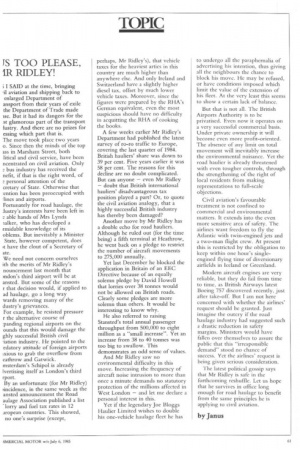TOPIC
Page 63

If you've noticed an error in this article please click here to report it so we can fix it.
TS TOO PLEASE, IR RIDLEY!
; I SAID at the time, bringing il aviation and shipping back to enlarged Department of ansport from their years of exile the Department of Trade made ise. But it had its dangers for the St glamorous part of the transport lustry. And there are no prizes for essing which part that is.
The move took place two years o. Since then the minds of the top ass in Marsham Street, both litical and civil service, have been ncentrated on civil aviation. Only .t bus industry has received the nefit, if that is the right word, of personal attention of the cretary of State. Otherwise that ;ention has been preoccupied with lines and airports.
Fortunately for road haulage, the iustry's interests have been left in r. able hands of Mrs Lynda ialker, who has developed a rinidable knowledge of its oblems. But inevitably a Minister State, however competent, does ,t have the clout of a Secretary of ate.
We need not concern ourselves ith the merits of Mr Ridley's nouncement last month that mdon's third airport will be at ansted. But some of the reasons r that decision would, if applied to ad haulage, go a long way wards removing many of the dustry's grievances.
For example, he resisted pressure r the alternative course of :panding regional airports on the ounds that this would damage the ghly successful British civil iation industry. He pointed to the edatory attitude of foreign airports xious to grab the overflow from eathrow and Gatwick.
msterdam's Schipol is already lvertising itself as London's third Tort.
By an unfortunate (for Mr Ridley) lincidence, in the same week as the ansted announcement the Road aulage Association published a list -lorry and fuel tax rates in 12 iropean countries. This showed, no one's surprise (except, perhaps, Mr Ridley's), that vehicle taxes for the heaviest artics in this country are much higher than anywhere else. And only Ireland and Switzerland have a slightly higher diesel tax, offset by much lower vehicle taxes. Moreover, since the figures were prepared by the RHA's German equivalent, even the most suspicious should have no difficulty in acquitting the RHA of cooking the books.
A few weeks earlier Mr Ridley's Department had published the latest survey of ro-ro traffic to Europe, covering the last quarter of 1984. British hauliers' share was down to 39 per cent. Five years earlier it was 58 per cent. The reasons for this decline are no doubt complicated. But can anyone — even Mr Ridley — doubt that British international hauliers' disadvantageous tax position played a part? Or, to quote the civil aviation analogy, that a highly successful British industry has thereby been damaged?
Another move by Mr Ridley has a double echo for road hauliers. Although he ruled out (for the time being) a fifth terminal at Heathrow, he went back on a pledge to restrict the number of aircraft movements to 275,000 annually.
Yet last December he blocked the application in Britain of an EEC Directive because of an equally solemn pledge by David Howell that lorries over 38 tonnes would not be allowed on British roads. Clearly some pledges are more solemn than others. It would be interesting to know why.
He also referred to raising Stanstecl's total annual passenger throughput from 500,000 to eight million as a "small increase". Yet an increase from 38 to 40 tonnes was too big to swallow. This demonstrates an odd sense of values.
And Mr Ridley saw no environmental difficulty in this move. Increasing the frequency of aircraft noise intrusion to more than once a minute demands no statutory protection of the millions affected in West London — and let me declare a personal interest in this.
Yet if the legendary Joe Bloggs Haulier Limited wishes to double his one-vehicle haulage fleet he has to undergo all the paraphernalia of advertising his intention, thus giving all the neighbours the chance to block his move. He may be refused, or have conditions imposed which limit the value of the extension of his fleet. At the very least this seems to show a certain lack of balance.
But that is not all. The British Airports Authority is to be privatised. Even now it operates on a very successful commercial basis. Under private ownership it will become even more profit-oriented. The absence of any limit on total movement will inevitably increase the environmental nuisance. Yet the road haulier is already threatened with even tougher controls, through the strengthening of the right of local residents from making representations to full-scale objections.
Civil aviation's favourable treatment is not confined to commercial and environmental matters. It extends into the even more sensitive area of safety. The airlines want freedom to fly the Atlantic with twin-engined jets and a two-man flight crew. At present this is restricted by the obligation to keep within one hour's singleengined flying time of diversionary airfields in Iceland or Greenland.
Modern aircraft engines are very reliable, but they do fail from time to time, as British Airways latest Boeing 757 discovered recently, just after take-off. But I am not here concerned with whether the airlines' request should be granted. Just imagine the outcry if the road haulage industry had suggested such a drastic reduction in safety margins. Ministers would have fallen over themselves to assure the public that this "irresponsible demand" stood no chance of success. Yet the airlines' request is being given serious consideration.
The latest political gossip says that Mr Ridley is safe in the forthcoming reshuffle. Let us hope that he survives in office long enough for road haulage to benefit from the same principles he is applying to civil aviation.
by Janus




































































































